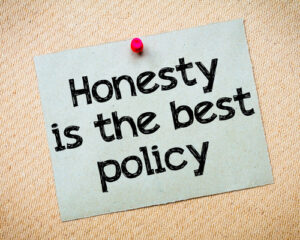
Honesty is a real lifesaver for people in addiction recovery; truthfulness, with yourself and others, is key to long-term sobriety. Most people working a program would probably agree that it’s not always easy telling the truth. After years of duplicitous behavior, many find it trying to let others know what is bouncing around their mind. For some, dishonesty is ostensibly second nature, and turning it off takes practice.
In most cases, a failure in forthrightness is venial, or forgivable. Case in point: Did you call your sponsor today? Answering yes (when the opposite is true), isn’t necessarily going to result in returning to drug or alcohol use. However, making a practice of telling even white lies, can come back to haunt a person. Being mendacious – in certain circumstances – may not be inherently harmful; but, even half-truths and omissions can set a dangerous precedent. Men and women in recovery who present delusive impressions to their peers, subvert progress!
People incapable of being honest with their peers or sponsor about doing the Work are likely going to be the same individuals who keep a relapse to him or herself. It’s exceedingly common; a relapse occurs, and a series of charades follows closely behind—indefinitely. Fear of social consequences drives some to continue attending meetings and sharing; they feel unable to divulge the fact their program has eroded. Such instances are the epitome of the disease of addiction at work; too sick to pull back the curtain, too prideful to ask for help.
Reasons for Being Dishonest (In an Honest Program)
A couple of idioms that hold water in recovery: honesty is the best policy and pride comes before the fall. Each person in the program, whether he or she has a week or ten years sober, wants to succeed. Everyone would like to be free from the bondage of self, a veritable ball-and-chain keeping one from fulfilling his or her real potential. Even though telling the truth is more straightforward than dishonesty, human beings tend to convince themselves that the opposite is factual. Unfortunately, for addicts and alcoholics, the above mindset carries with it a substantial and pernicious cost.
Myriad kinds of deceit exist and why one feels the compulsion to be deceitful is subjective. However, in the rooms of recovery, lying is often the byproduct of desiring to meet other people’s expectations. Or, better still, what one believes is expected of a person in recovery. Both men and women have a way of gauging their successes in life on other’s perceptions. This reality can create an echo chamber of sorts or opposing mirror effect. Justifying a deception now and again becomes more comfortable to stomach, as such. If one’s peers think they are doing well, it’s possible to internalize and convince oneself that everything is OK.
In early recovery, there is an internal power struggle for control between the disease and the spirit. An apt characterization of addiction is ‘self-will run riot,’ the misconception that one holds dominion over their existence. Sometimes people lie because honesty can feel like ceding control. Many individuals think that they alone must influence the narrative of life. Moreover, such people are willing to go to great lengths to achieve that goal. Persons deluding themselves and others in recovery may find that truth is inconvenient!
Cascading Lies Lead to Relapse
Dishonesty is defendable, at times, when hoping to avoid offending others. Duplicity is, after all, a human behavior; it is likely that nobody is honest all the time. We all know that established social, and behavioral norms almost demand one lie on occasion. Still, all who contend with mental illness needs be wary of being misleading or lying by omission.
Those who omit specific details with their support network tend to experience enormous guilt and shame. Motivations for lying aside, individuals who keep unhealthy thoughts or feelings from their peers become mired in stress. Each person in recovery has shortcomings they must contend with; and, the program provides recourse for addressing imperfections. Downplaying weaknesses for fear of judgment or social persecution is counterproductive. Minimizing deficiencies to your peers will destabilize the mission to heal and erodes any advancements.
In recovery, as in life, men can and do struggle with sharing emotions and vulnerabilities. An inability to open oneself up entirely to their support group has unintended consequences. Guarded individuals are more vulnerable to relapse. Those unable to practice honesty in every affair will find being accountable to and responsible for a program an impossibility. Each of us learns at a young age that lies beget lies, untruths snowball quickly and become hard to contain.
If you tell the truth, you don’t have to remember anything.” —Mark Twain
A single drop of dishonesty can honestly morph into a torrential downpour of negative emotions. People who can’t find the strength to come clean, with haste, put more than their recovery at risk.
Addiction Recovery
Please reach out to PACE Recovery Center to take the first step toward recovery and leading a life of authenticity. We offer a safe place, for men in the grips of alcohol or substance use disorder, to delve into the underlying issues of their illness. We can provide tools and teach you skills to live honest, happy, joyous, and free.


